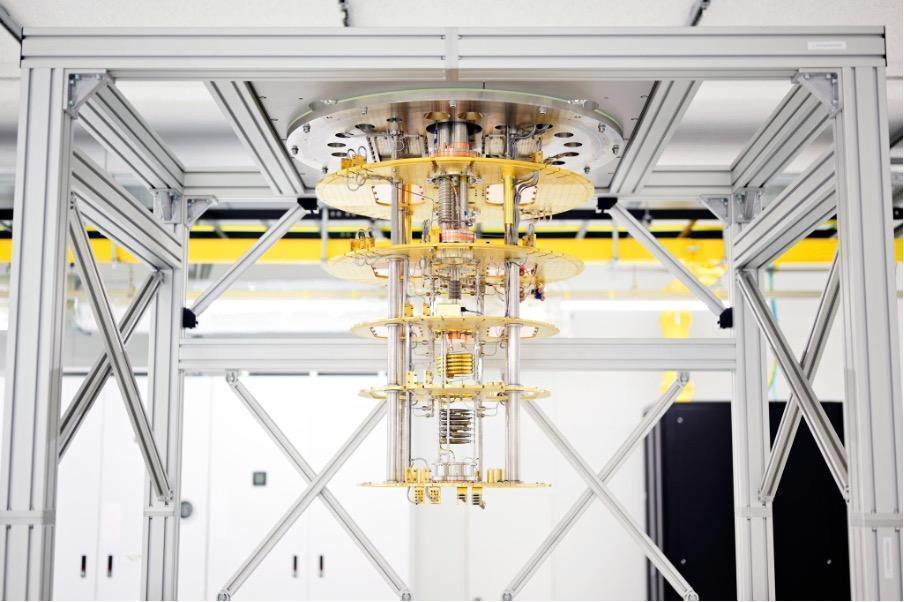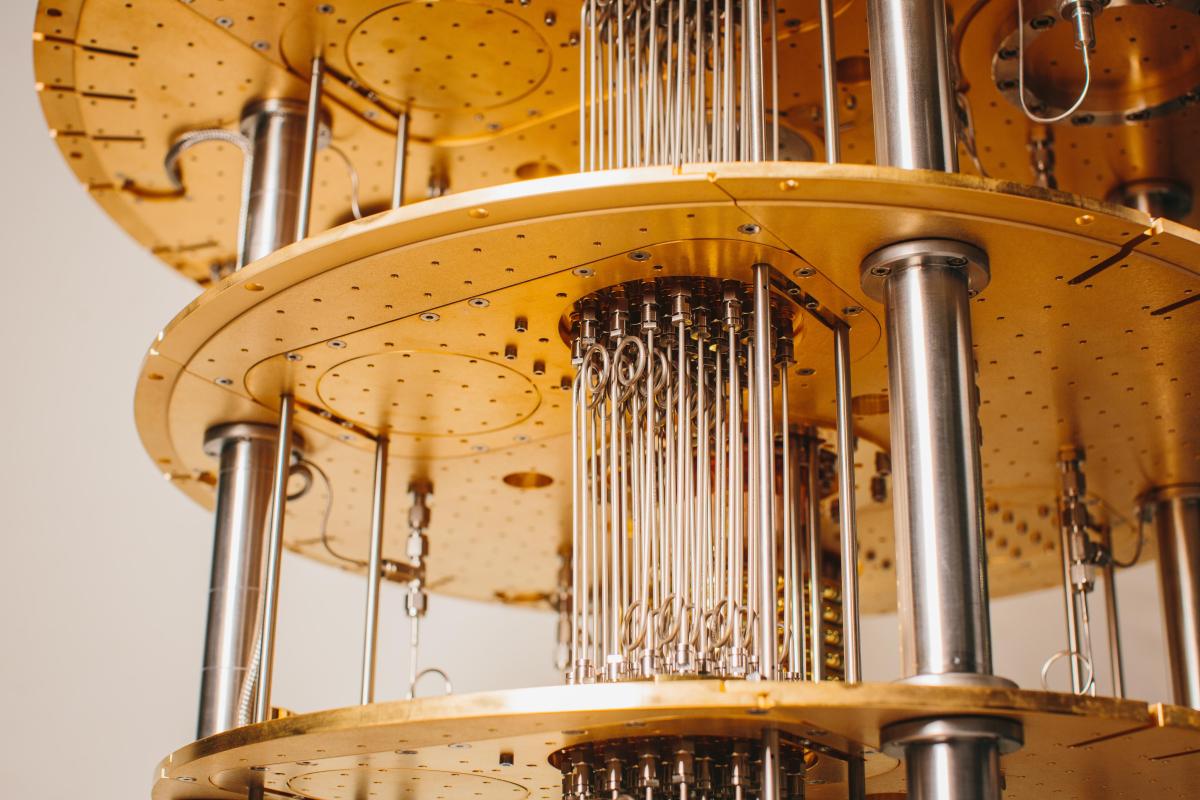Applications
 Part of the Oxford Instruments Group
Part of the Oxford Instruments Group
Expand
Collapse
In 2020, when quantum computing in data centres was a largely untested concept, Oxford Instruments took a bold step forward. As part of a UKRI (UK Research and Innovation) Innovate UK programme we hosted Rigetti’s 32-qubit Aspen™-class quantum computer at our Tubney Woods facility using our ProteoxLX dilution refrigerator. The system was made available over the cloud to Rigetti’s UK partners via its Quantum Cloud Services (QCS™) cloud computing platform. This experience of operating a quantum computer in a commercial and connected environment taught us invaluable lessons, propelling us to develop tried and tested data centre solutions.
While others are just beginning to consider quantum-data centre integration, we have already refined our approach, working closely with our partners to create innovative and scalable solutions. Our early start has not only given us a lead; it has transformed how we think about quantum computing infrastructure.
Supporting our customer Oxford Quantum Circuits (OQC) we are proud to say that we have installed dilution refrigerators in three live data centres across the world in the last 18 months. These include, in September 2022 the world’s first integration of a quantum computer in a colocation data centre at the Centersquare (formerly Cyxtera) Digital Exchange, and in May 2023 in an Equinix data centre in Japan.
Our experience hosting Rigetti’s system was a useful lesson in the differences between a lab and a data centre. While our factory is not the equivalent of a co-location space, we learned directly what is required to achieve high availability, reliability, and fault tolerance. Data centres have solved the problem of reliable infrastructure through redundancy, and we have been able to apply this to our systems, increasing critical factors of mean time between failure (MTBF) and mean time to service (MTTS). Essentially, we made dilution refrigerators data centre ready.
While our Innovate UK project was in its final phases with Rigetti and partners the Quantum Software Lab at the University of Edinburgh, Phasecraft, and Standard Chartered Bank, we were able to apply our knowledge to Quantum Processing Unit (QPU) deployments in live data centres with OQC, getting better and better with each deployment.

There are specific logistical challenges that a data centre poses for a quantum system. Vibration isolation is a critical factor that we have addressed from the ground up. Our unique frames and anti-vibration (AV) bellows are engineered to eliminate vibrations, ensuring that qubits remain stable and minimising the introduction of external noise that could degrade performance and decrease coherence times, without the need for specific costly AV solutions.
How do you fit two, three or four systems within a compact footprint for data centre operation? Floor space is at a premium in the data centre, which needs to house vast amounts of computing equipment, including servers, networking infrastructure, cooling systems, and power distribution units. We have worked with OQC to understand their requirements for a compact installation and through them with data centres on different solutions, some practical and some training related. We are also working on solutions to make it as easy as possible for data centres to add quantum computing systems, including actions to reduce or remove facilities that are not typically found in data centres.
We have created a data centre version of the Proteox dilution refrigerator with optimised racks and ancillaries and a reduced frame footprint to take up less floor area, reducing deployed costs.
Our innovative Proteox design incorporates unique side-loading Secondary Inserts (SIs), which can be removed and exchanged between Proteox systems. This means that wiring can be done offline, in a different location. This allows pre-tested modules of computing capability to be deployed quickly, with high confidence as QPUs with higher qubit counts and increased fidelities are developed, future proofing the investment.
For data centre quantum computers, this offers the ability to perform local testing before integrating into a remote colocation data centre. Wiring can be fully tested at various temperatures, depending on the customer’s capability, including at mK, 4 K and room temperature, providing unparalleled reliability and confidence in the system's performance.
We can also work with customers to prepare prebuilt and tested secondary inserts so that if an issue should arise later, users can also swap out inserts with new, pre-validated ones, and operations continue with the minimum disruption.
The removable secondary insert also plays an important role in scaling. If a user wants to increase their wiring count in the future, they might not want to replace their entire quantum hardware platform. As wiring requirements evolve, our dilution refrigerators make it possible to replace the QPU and wiring stack on the secondary insert(s) without the need to overhaul the wider infrastructure. This future-proofing capability maximises longevity and value.

Beyond our innovative technologies, Oxford Instruments' global footprint of highly trained service engineers ensures that systems receive round-the-clock support, minimising downtime. Our team of experts has been specifically trained to service quantum computing systems in data centres, providing the peace of mind that mission-critical infrastructure is in capable hands.
Our Japanese team of service engineers for example has been retrained from only servicing the fleet of healthcare systems within the country to also servicing and monitoring dilution refrigerators within the data centre, ensuring our customers systems have the highest uptime. We also offer the ability for customers to remotely monitor their system themselves using oi.DECS, our web-based, platform-independent software with live dashboards.
We expect the presence of quantum computers in conventional data centres to grow steadily in the coming years. Quantum devices are starting to handle real-world workloads. As demand for quantum computing increases and businesses make investments in quantum infrastructure, we can expect to see more data centres deployments.
As quantum computers evolve from experimental lab systems into tools that businesses can leverage, the data centre becomes a natural place for them to live. The established IT framework and reliable infrastructure in co-location data centres eliminate the need for companies to make substantial investments in constructing their own quantum computing facilities. This setup also substantially mitigates risks associated with data transfer and management.
Though challenges remain in optimising facilities and dilution refrigeration hardware for quantum computing’s unique needs, we are proud to partner with companies like OQC who are steadily making those challenges disappear. We are proud to be helping support the trend since 2022 of housing quantum systems alongside classical servers in data centre environments, making it an increasingly common reality.
Further Reading